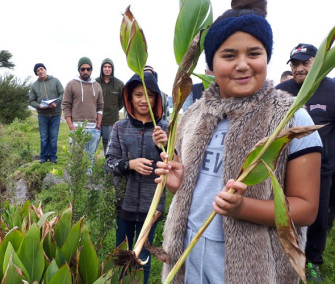Developing a shared vision and values | Te whakawhanake i tētahi aronga me ētahi mātāpono ōrite
Working together to identify a shared vision and values can help a diverse group choose a common direction.
On this page
Any transition process will involve people and groups with diverse perspectives, interests, experiences and aspirations. However, we often have more in common than we may think at first. Having a shared vision and values for change brings into focus the desired future to work towards together.[1]
There is no need to agree on a single shared vision. The development of multiple visions for a desired future can help reveal commonly held values, ambitions and goals. A group can have unity of purpose without uniformity of view, embracing both individual interests and commonalities.
Conversations about visions create opportunities for participants to understand different perspectives, recognise mutual interests, discover complementary skills and competencies, and identify areas for collaboration.
“Getting shared principles through community-wide engagement is so important to achieve a threshold of trust. Then we need guardians to look after the principles all the way through to the vision.”
Just Transitions Dialogue participant
There are many useful tools to help you collaborate to develop a positive vision of the future, in which people can meet their needs in a sustainable way. These tools offer different ways you can structure conversations to identify and build common or converging interests, tease out values and identify differing interests.
Interest based problem solving(external link) — Employment Relations Centre
Backcasting(external link) — Department of the Prime Minister and Cabinet
Can pōwhiri help us collaborate?(external link) — Our Land and Water
Each of these 3 methods has its own benefits and outcomes, so take the time to consider which would be best for your particular context.
Te Arawa’s strategic vision (Central North Island)
 Te Arawa’s strategic vision is:
Te Arawa’s strategic vision is:
Te Arawa, ahu Hawaiki.
Past, present and future generations of Te Arawa – secure and well.
This intergenerational vision seeks to ensure the adaptation and survival of Te Arawa’s people, cultural practices and taonga treasured species in a world in which they can thrive.
Te Ara ki Kōpū: Te Arawa climate change strategy(external link) — Te Arawa
Photo credit: Lani Kereopa
Values are principles, beliefs or qualities that guide desirable behaviour. They can apply at the personal, organisational or cultural levels. Examples of commonly held values include honesty, integrity, fairness, justice, respect, caring, transparency, accountability and commitment. The mātāpono principles in section 1.4 reflect values from te ao Māori the Māori worldview. Agreement on shared values can help create a safe and constructive space for collaboration across diverse interests.
An example of values from a youth non-governmental organisation (Nationwide)

Generation Zero, a youth-led group of New Zealanders seeking intergenerational climate justice, is guided by the following organisational values:
- Rangatiratanga: Collaboration, Te Tiriti
- Climate justice: Compassion, manaakitanga, respect
- Friendship first: Active relationships, wellbeing
- Non-partisan: Solutions focused, evidence based
Our story(external link) — Generation Zero
Photo credit: Generation Zero

